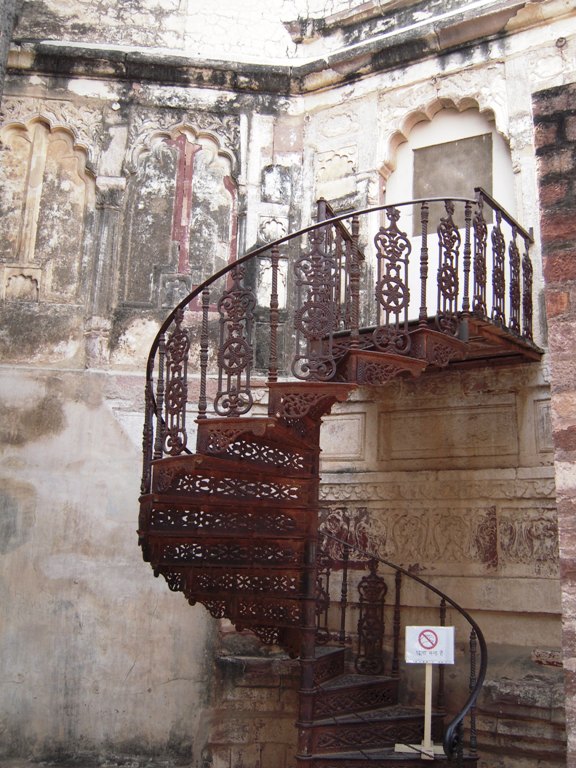FWP:
SETS == HUMOR; MUSHAIRAH
In classic mushairah-verse style, the first line is extremely vague and rather moralistic-sounding. All the hearers can get out of it is a rather smug, virtuous claim: we're not lazy, we don't waste our time loafing around. The evidence for this claim, an example of this exemplary behavior, is what we're expecting in the second line-- after we're finally, under mushairah performance conditions, permitted to hear it.
And indeed, what we get in the second line is an account of how the speaker uses time efficiently, how he fits in small errands whenever he has an unexpected bit of leisure. For example, when the main errand that would have been his goal-- attending upon some superior person, individually or in a 'court' setting-- proves not to be necessary or possible, he immediately sees the chance to cross off another minor errand from his list. So at the very end of the verse we learn the nature of this minor, secondary errand: he 'stops by' the Ka'bah! What a punch this last phrase must have packed, and how the audience must have enjoyed it!
Part of the 'punch' is obvious-- what an indignity, what a piece of 'mischievous' or rakish behavior, to think of the Ka'bah as merely a secondary, minor destination, to be slotted in as a backup possibility among more important visits. But equally wonderful is the casual, colloquially untranslatable ho aa))e (short for ho kar aa))e -- literally, 'having been [there], came [back]'). In English, 'stopped by' has something of the same ease and sense of short duration and opportunistic happenstance and being on the way to somewhere else; 'dropped by' would be similar.
What kind of a place is 'that door'? Bekhud Mohani insists that it's the divine Beloved's real, mystically-knowable 'inner' door, the one that a Sufi would seek. Of course, it might also be the human beloved's door. To conflate the two is, after all, business as usual in the ghazal world. (One of my favorite examples is the first line of {233,8}, which speaks of 'circumambulation of the street of disgrace'.) In either case, the point of the verse is to show, offhandedly, how trivial a visit to the Ka'bah is by comparison to entry at 'that door'.
Why doesn't the speaker perform his intended errand at 'that door'? The obvious reading is that he doesn't obtain 'admission' there, for any or all of the usual ghazal reasons. But there's a piquant secondary possibility: that the (divine or human) Lord might have chosen not to hold court that day (see the definition of baar above). Perhaps it's his duty to attend when court is being held, as any proper courtier should (and as Ghalib himself often had to do at the Red Fort, and often complained about in his letters). So the speaker goes to 'that door' first, to see if his attendance is required; it's only when the Lord of the court has chosen not to hold court that day that the speaker is free to use the time for minor errands.
Adding piquancy to the 'court' reading is the fact that baar is readily equated with the common compound word dar-baar . And surely by no coincidence, the verse offers us not the whole compound but, more subtly, both halves of it, placed only a few words apart: us dar pah nahii;N baar . This is one more lovely example of what Faruqi would call wordplay that is also meaning-play.
It's also left to us to decide what kind of an alternative it is when we leave 'that door' to stop by the Ka'bah. Here are some possibilities:
='That door' and the Ka'bah are very similar; first the speaker 'stopped by' at 'that door', then when nothing was doing there he 'stopped by' the Ka'bah. The only difference is that the Ka'bah is just a bit inferior, so it makes a good second choice, a backup.
='That door' and the Ka'bah are similar, except that the Ka'bah is so greatly inferior that the speaker would only drop by if he had some time to kill-- or if he was vexed by his non-admission at the real 'door'. (Compare {22,2}, in which the speaker leaves in vexation when he's not admitted to the Ka'bah). Is the emphatic hii perhaps a sign of some such vexation?
='That door' and the Ka'bah are very different: if the speaker can't do something really desirable in the line of his main aspiration, he might as well do something entirely other (for a similar idea see {9,4}). Then the further question arises-- why does he think of going to the Ka'bah in particular? Is going there a pleasure, a duty, a minor religious or social obligation, a casual piece of sightseeing, or something else? This too is left for every reader to decide-- and perhaps decide afresh at every reading.
In a verse like this, intonation is crucial, and you know Ghalib would never dream of telling us what he had in mind. Because surely part of what he had in mind was how compelling this sort of penumbra of possibilities would make his verses. I wonder if he ever thought of a worldwide audience? But then, why would he not? Remember his ode to Queen Victoria. I think he'd love having all of us new, serious, exploratory readers.
Compare {231,7}, with its equally casual proposal of 'a stroll' around Mount Tur.
And compare also Mir's equally (and equally irresistibly) offhand treatment of the 'turmoil of Doomsday': M{667,11}.

Nazm:
That is, this too was a gadding-about. (176)
== Nazm page 176